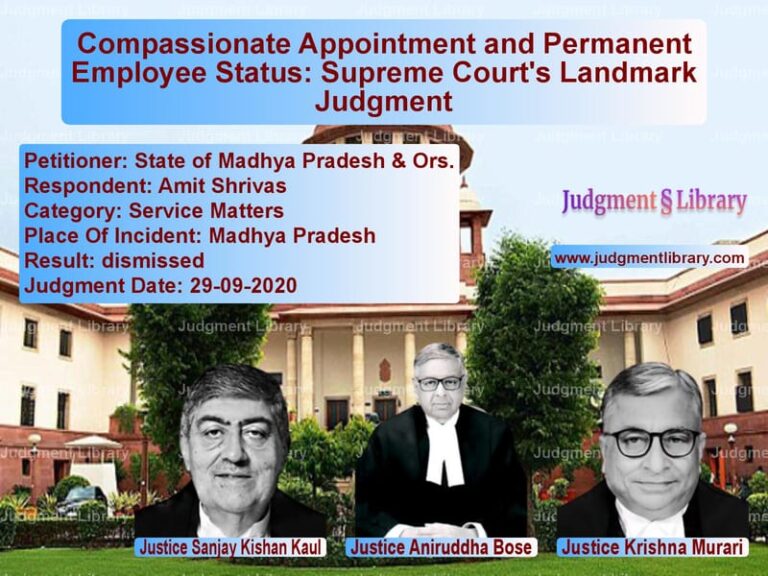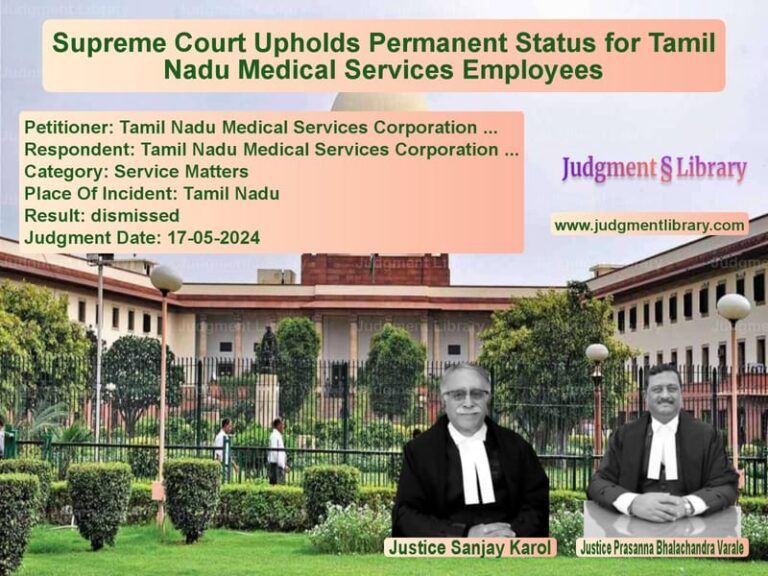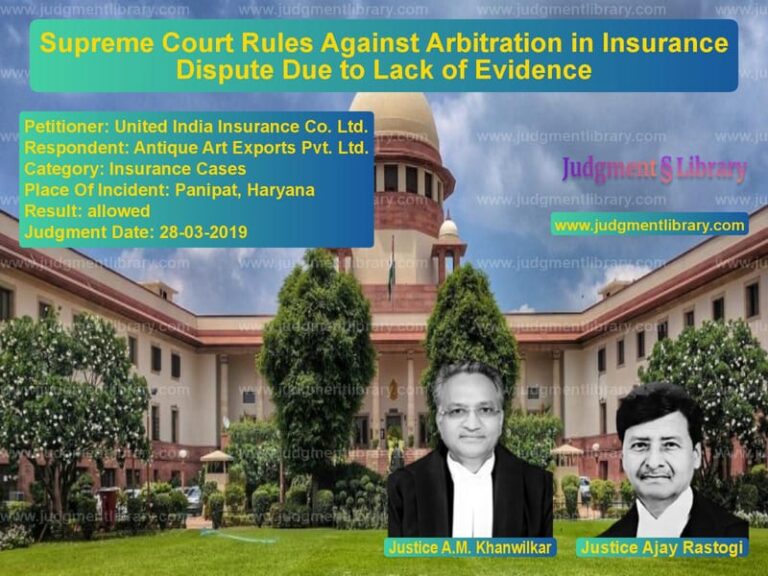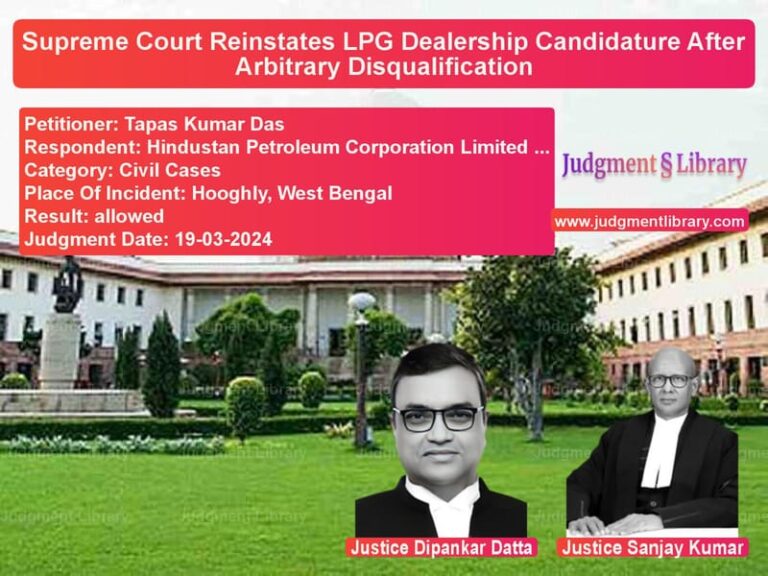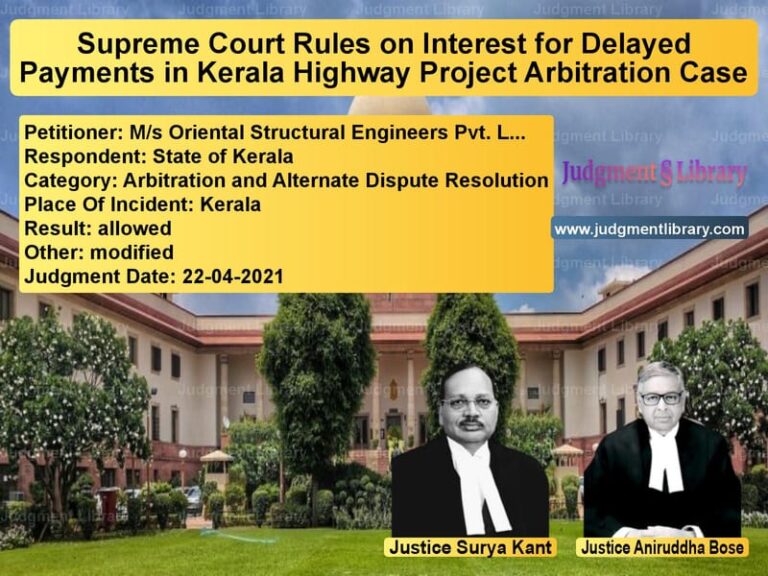Legal Ethics and Professional Misconduct: Supreme Court’s Directives for Bar Council Accountability
The Supreme Court of India recently ruled on a significant case concerning legal ethics, professional misconduct, and the accountability of the Bar Council in handling complaints against advocates. The case, K. Anjinappa vs. K.C. Krishna Reddy & Anr., highlighted the procedural lapses in the disciplinary proceedings of the Bar Council and issued strict guidelines to ensure timely disposal of complaints against legal professionals.
Background of the Case
The appellant, K. Anjinappa, had filed a complaint against his advocate, alleging professional misconduct. The complaint was initially lodged before the Bar Council of the State of Andhra Pradesh. However, despite the legal requirement to dispose of such complaints within one year, the State Bar Council failed to act on it. As per Section 36B of the Advocates Act, 1961, the complaint was subsequently transferred to the Bar Council of India.
The Bar Council of India dismissed the complaint on the ground that one of the complainants had not signed the petition and did not examine the allegations of misconduct on merits. Aggrieved by this dismissal, the appellant approached the Supreme Court.
Petitioner’s Arguments
The petitioner contended:
- The Bar Council of Andhra Pradesh failed to discharge its statutory duty by not resolving the complaint within the mandated one-year period.
- The Bar Council of India dismissed the complaint without considering its merits.
- The dismissal of the complaint solely on procedural grounds undermined the very objective of the Advocates Act, which seeks to ensure accountability in the legal profession.
- The legal fraternity must uphold professional ethics, and delays in resolving complaints erode public trust in the justice system.
Respondent’s Arguments
The respondents, including the Bar Council of India, argued:
- The complaint was defective as it was not signed by all complainants.
- The delay in processing the complaint was due to administrative constraints and the COVID-19 pandemic.
- The Bar Council of India was handling an excessive number of transferred cases due to the failure of State Bar Councils to resolve complaints.
- They were making every effort to clear the backlog of disciplinary cases.
Supreme Court’s Observations
The Supreme Court took strong exception to the way disciplinary complaints were being handled by the Bar Councils. The Court made the following key observations:
1. Delay in Disciplinary Proceedings Violates the Advocates Act
The Court noted that under Section 36B of the Advocates Act, State Bar Councils must resolve complaints within one year, failing which they are transferred to the Bar Council of India. However, in many instances, complaints remained unresolved for years.
“The failure of State Bar Councils to act on complaints within the stipulated time undermines the credibility of the legal profession and erodes public confidence in the judiciary.”
2. Role of the Bar Council in Maintaining Legal Ethics
The Court reaffirmed the duty of the Bar Council to uphold professional standards:
“The Bar Councils have been created not just to protect the rights of advocates but also to safeguard the public interest by ensuring high ethical standards in the legal profession.”
3. No Justification for Delay Due to COVID-19
The Court rejected the argument that the pandemic was a valid excuse for the backlog, stating:
“The delay in disposal of complaints existed long before the pandemic. The failure to act promptly on complaints cannot be justified by external circumstances.”
4. Need for Transparency in Disciplinary Actions
The Supreme Court directed the Bar Council of India to maintain a record of complaints and their resolution status. It ordered:
- All disciplinary cases must be resolved within one year.
- State Bar Councils must submit a compliance report on pending cases.
- The Bar Council of India must publish a report detailing cases transferred and their resolution.
Supreme Court’s Directives
The Supreme Court issued the following binding directives to improve accountability:
1. Timely Disposal of Complaints
- State Bar Councils must resolve complaints under Section 35 of the Advocates Act within one year.
- If unresolved, complaints must be transferred to the Bar Council of India, which must resolve them within one year.
2. Strengthening of Disciplinary Committees
- State Bar Councils must establish a panel of experienced advocates or retired judicial officers to expedite inquiries.
- The Bar Council of India must monitor compliance and take corrective actions against defaulting State Bar Councils.
3. Monthly Reporting and Review Mechanism
- Each State Bar Council must submit a monthly report detailing pending and resolved cases.
- The Bar Council of India must conduct quarterly reviews and take action against delays.
4. Enhanced Transparency
- The Bar Council of India must publish an annual report on the status of complaints and disciplinary proceedings.
- State Bar Councils must ensure complainants have access to case status updates.
Implications of the Judgment
This landmark ruling is set to have a profound impact on the legal profession in India. The key takeaways include:
- Improved Accountability: Advocates accused of professional misconduct can no longer evade disciplinary action due to procedural delays.
- Faster Resolution of Complaints: The strict timeline for case disposal will ensure that complaints are addressed in a timely manner.
- Restoration of Public Confidence: The enforcement of legal ethics will enhance the credibility of the judiciary and the legal profession.
- Systemic Reforms: The directives will force Bar Councils to adopt more efficient case management systems.
This Supreme Court ruling reinforces the principle that lawyers, as officers of the court, must adhere to the highest standards of professionalism. The decision also sends a strong message to the Bar Council of India and State Bar Councils that disciplinary negligence will no longer be tolerated.
Petitioner Name: K. Anjinappa.Respondent Name: K.C. Krishna Reddy & Anr..Judgment By: Justice M.R. Shah, Justice B.V. Nagarathna.Place Of Incident: Andhra Pradesh.Judgment Date: 17-12-2021.
Don’t miss out on the full details! Download the complete judgment in PDF format below and gain valuable insights instantly!
Download Judgment: k.-anjinappa-vs-k.c.-krishna-reddy-&-supreme-court-of-india-judgment-dated-17-12-2021.pdf
Directly Download Judgment: Directly download this Judgment
See all petitions in Legal Malpractice
See all petitions in Contempt Of Court cases
See all petitions in Disciplinary Proceedings
See all petitions in Judgment by Mukeshkumar Rasikbhai Shah
See all petitions in Judgment by B.V. Nagarathna
See all petitions in allowed
See all petitions in Modified
See all petitions in supreme court of India judgments December 2021
See all petitions in 2021 judgments
See all posts in Service Matters Category
See all allowed petitions in Service Matters Category
See all Dismissed petitions in Service Matters Category
See all partially allowed petitions in Service Matters Category


